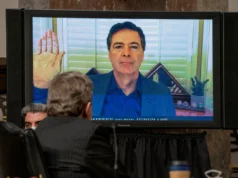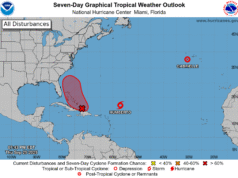
— Budgetary matters —
Gov. Ron DeSantis may spend a lot of time on the campaign trail, but we also expected him to roll out his budget for 2024 in the next several days.
Senate committees have already scheduled Dec. 6 to hear presentations from DeSantis’ budget staff in several areas, including the Governor’s budget recommendations on health care spending and key agencies such as the Agency for Health Care Administration (AHCA) and the Department of Health (DOH).
DeSantis must submit his spending plan to state legislators at least 30 days before the scheduled Jan. 9 opening day of Session. The timeline laid out by the Senate suggests the Governor will release it between now and next Tuesday.

This will be the sixth set of budget recommendations outlined by DeSantis, but unlike the last several years, he has yet to give a lot of hints or spelled out many of his top priorities ahead of time. Given the state’s continued budget surplus, DeSantis has suggested he will probably ask for a fresh round of tax cuts. Still, he needs to outline many other significant spending items.
One item of interest will be the state’s Medicaid budget and how much state money will need to be set aside for the program funded jointly with the federal government. State economists have projected the caseload will continue to drop from a peak during the COVID-19 emergency as state officials continue to trim the rolls even as outside groups and even the federal government raise alarm bells at the rate.
Medicaid enrollment during the calendar year has dropped from 5.77 million at the end of April to 5.10 million at the end of October. Economists had previously projected that Medicaid enrollment would dip to about 5.02 million by the end of June 2024.
___
I welcome your feedback, questions and especially your tips. You can email me at SextonHealthNewsletter@gmail.com or call me at 850-251-2317.
— Grand jury update —
Nearly a year ago, at DeSantis’ urging, the Florida Supreme Court agreed to impanel a statewide grand jury to look at pharmaceutical companies and others involved in developing and distributing COVID-19 vaccines.
But so far, the grand jury has issued no reports or given any updates on its work and, at some point, the clock will tick down.
Statewide grand juries are appointed for one year. However, the court can extend the term by six months if petitioned by a majority of the statewide grand jury or by the legal adviser to the statewide grand jury. A grand jury looking at immigration issues, for example, asked for and was granted an extension until April 2024.

The one-year mark, however, is not tied to the court’s order but to when the grand jury itself is seated, according to a representative for the Supreme Court. That date appears to have been later in the spring of 2023.
A key question remains whether the grand jury will produce findings that DeSantis can tout on the presidential campaign trail. The Iowa caucuses are Jan. 15, and the DeSantis campaign is counting on a solid showing for momentum in his challenge to former President Donald Trump.
DeSantis, who early on promoted the use of vaccines only to express skepticism on their effectiveness later, filed a petition in December 2022 asking the court to bless the creation of a grand jury to look into the safety and efficacy of vaccines, adding that “an investigation is warranted to determine whether the pharmaceutical industry has engaged in fraudulent practices.”
During his presidential bid, DeSantis faulted Trump for sticking by top medical adviser Anthony Fauci. So, any adverse findings from the grand jury might aid the Governor’s criticisms of Trump.
The COVID-19 vaccine grand jury is currently presided over by the chief judge of Hillsborough County, with jurors selected from five different circuits in central and southwest Florida.
— Achtung, Weida —
According to social media sites, AHCA Secretary Jason Weida has been in Germany as part of the state’s trade mission, attending a health technology trade show and meeting with German health care officials and physicians.
Weida led Florida’s mission to the @MEDICATradeFair in Germany. ABHI, an acronym for the Association of British HealthTech Industries, sponsored the four-day trade show.

Meanwhile, the state Commerce Department posted on X that dozens of Florida medical companies displayed “cutting-edge, high-quality medical products and services.”
Weida also met with the Bavarian State Ministry of Health, which oversees the health care system for Bavaria’s 13 million residents.
Weida posted on X that the meeting “focused on hospital regulation, pharmaceutical pricing, and demographic changes and challenges.”
He also met with Klinikum Rechts der Isar CEO and medical director Dr. Martin Siess.
“Among other things, we discussed cancer treatment and innovation in the field of nuclear medicine with the head of the hospital’s department, Dr. Wolfgang Weber. I look forward to continuing our discussion of cancer innovation and connecting them with thought leaders in Florida,” Weida wrote on X.
Germany has universal health coverage provided by Statutory Health Insurance (SHI) and private health insurance (PHI). SHI is mandatory unless a person earns enough to opt out and purchase the PHI. Approximately 88% of the population receives primary coverage through SHI and 11% have PHI, according to The CommonWealth Fund.
— Naloxone confusion —
A Senate health panel next week is expected to advance legislation establishing June 6 as Naloxone Awareness Day. SB 66 creates in statute “Victoria’s Law,” which encourages the DOH to hold events to “raise awareness of the dangers of opioid overdose and the availability and safe use of naloxone as an effective way to rapidly reverse the effects of opioid overdose.”
But there is a battle of sorts going on between providers and the state over which naloxone product providers and the public can access: Narcan, a nasal spray typically administered in 4-milligram (mg) doses, and Kloxxado, administered in 8 mg doses and injectable forms of naloxone.

Law enforcement, through the Heroes Program, has been using other naloxone products like Kloxxado to reverse overdoses for two years, shortly after it earned Food and Drug Administration approval.
Some substance abuse providers have been pushing for access to the more powerful Kloxxado, arguing that as fentanyl becomes more powerful, so too are larger doses of naloxone.
DCF sent correspondence to providers earlier this month that specifies additional requirements for orders of higher doses (5 mg and 8 mg) of naloxone.
DCF Office of Substance Abuse and Mental Health’s Sumer Bonner told providers in an email that high dose formulations “will require an additional non-patient specific standing order to be signed for each product individually and there is an attestation of training for the 5 mg prefilled injectable.”
This contradicts a statewide standing order issued by Florida’s Surgeon General, allowing all forms of naloxone without these extra hurdles.
She attached two studies recommending administering a power dose of naloxone to reduce potential adverse effects, which can be life-threatening.
“Please take the time to review this information and education prior to placing the order,” she wrote in the email.
According to Florida’s plan for SOR funding, which DCF administers, the state will prioritize widespread community saturation for any FDA-approved naloxone nasal spray. Previously, the plan only allowed for the 4 mg variant.
— RULES —
AHCA proposes amending Rule 59A-36.006 regarding admission and continued residency criteria for assisted living facilities related to communicable diseases. More here.
AHCA proposes amending Rule 59A-36.011 regarding training requirements for assisted living facility staff providing specialized Alzheimer’s services. More here.
AHCA proposes amending Rule 59A-35.060, F.S., to move all licensure application forms into one rule and to require nursing homes, assisted living facilities, home health agencies, and homemaker/companion service providers to be revised to include a direct care workforce survey. More here.
The Board of Medicine (BOM) proposes to repeal Rule 64B8-1.007 regarding approved forms of anesthesia. More here.
The BOM proposes amending Rule 64B8-1.002 regarding its operations to delete a provision that allows compensating Board members for attending continuing medical education classes. More here.
The Board of Chiropractic Medicine proposes amending Rule 64B2-13.004 to update continuing education requirements. More here.
— Bills of interest —
Here is a list of some healthcare-related bills filed in the last two weeks.
SB 402 by Sen. Clay Yarbrough — Declarations of a public health emergency: Providing that the administration of vaccines is not within the meaning of the terms “treat,” “treated,” or “treatment” as they relate to public health emergencies; authorizing an individual to refuse examination, testing, or treatment under a State Health Officer’s order during a public health emergency by submitting a written refusal to the State Health Officer; deleting the State Health Officer’s authority to use any means necessary to treat an individual under certain circumstances. Effective date: July 1, 2024.

SB 442 by Sen. Lauren Book — Damages Recoverable in Wrongful Death Actions: Citing this act as the “Keith Davis Family Protection Act,” removing a provision that prohibits adult children and parents of adult children from recovering certain damages in medical negligence suits, etc. Effective date: July 1, 2024.
SB 436 by Sen. Erin Grall — Pregnancy and Parenting Resources Website: Requiring the Department of Health, in consultation with the Department of Children and Families and the Agency for Health Care Administration, to maintain a website that provides information and links to particular pregnancy and parenting resources; requiring each department and the agency to provide a clear and conspicuous link to the website on their respective websites; requiring the Department of Health to contract with a third-party to develop the website by a specified date, etc. Effective date: July 1, 2024.
Disclaimer
The information contained in South Florida Reporter is for general information purposes only.
The South Florida Reporter assumes no responsibility for errors or omissions in the contents of the Service.
In no event shall the South Florida Reporter be liable for any special, direct, indirect, consequential, or incidental damages or any damages whatsoever, whether in an action of contract, negligence or other tort, arising out of or in connection with the use of the Service or the contents of the Service. The Company reserves the right to make additions, deletions, or modifications to the contents of the Service at any time without prior notice.
The Company does not warrant that the Service is free of viruses or other harmful components
This article originally appeared here and was republished with permission.














